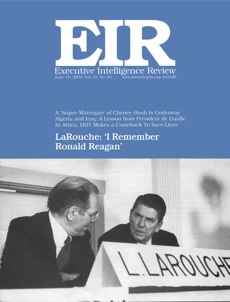A Personal Reflection: I Remember Ronald Reagan
by Lyndon H. LaRouche, Jr.
The Power of Ideas: SDI Changed the World
by Jeffrey Steinberg
Counterintelligence Editor Jeffrey Steinberg’s 1993 review of the planning and launching, on March 23, 1983, of the policy shift that brought the Soviet Union to collapse.
The Soviets’ Fatal Reaction to Reagan and LaRouche
by Rachel Douglas
Eastern Europe Editor Rachel Douglas described in detail, in a 1993 presentation, why after the SDI announcement, in LaRouche’s words, “Moscow regards me with a curious sort of fascination, and ... considers everything I say on policy matters to be influential, and very credible.”
Strategic Studies
The Algeria Paradox: Will Bush or Kerry Learn a Lesson from Charles de Gaulle?
by Pierre Beaudry
The clearest exemplar of a modern national leader who was capable of realizing when not to “stay the course,” and acting forcefully on that decision, was French President Charles de Gaulle, who ended France’s bloody attempt to keep colonial control over Algeria. Pierre Beaudry reports the details of de Gaulle’s choice to admit, publicly, a national mistake—and thereby save France from right-wing coup and national disaster.
Science & Technology
In Africa, DDT Makes a Comeback To Save Lives
by Marjorie Mazel Hecht
Spurred by the dramatic and life.saving results in a few African nations that persisted in using DDT, a larger group of nations, now malaria-ravaged, want to use the banned pesticide.
National News
‘Super-Watergate’ Hits Bush and Cheney
by Edward Spannaus
The Watergate-type pattern is striking—and the overall process is clear to those familiar with the fight that LaRouche and his associates have been waging against the neo.conservatives in the Administration, and against Vice President Dick Cheney in particular, for the past two years. Now, the Abu Ghraib torture scandal has put the issue of war crimes on the table.
LaRouche Challenges Kerry To Show Some Guts
by Nancy Spannaus
Will the “presumptive” Democratic nominee back the embattled House senior Democrats on Abu Ghraib?
House Democrats’ Letter to the President
Rumsfeld Hits a Buzzsaw in Singapore
by Michael Billington
Close Asian allies charge United States anti-terror policy spreads terrorism.
Bush-Cheney Presidency: Worse Than Watergate
by Edward Spannaus
Review of John Dean’s new book on George W. Bush’s Secret Presidency.
LaRouche Youth Movement Pokes at Soros’ Dems
by Matthew Ogden
Unravelling Ravelston: RICO and Richard Perle
by Scott Thompson
Congressional Closeup
by Carl Osgood
International News
Sharon’s Generals Plan a New Six-Day War with Egypt
by Dean Andromidas
A signal piece by Israeli military commentator Amir Oren, and several military and intelligence sources, warn that shifts in U.S.-Israel military point to Israeli Defense Forces’ preparations to confront Egypt, in much the same way the 1967 war was triggered.
‘Project Daniel’ Is Issued by Israel’s Dr. Strangeloves
by Dean Andromidas
Unchanging Afghanistan: Whither Karzai?
by Ramtanu Maitra
‘To Be Ethical and Still Succeed’
In the conclusion of a two-part interview, Maxim Ghilan discusses Israel’s peace movement and his mission for it.
Australia Is in the Middle of the Iraq Torture Scandal
by Allen Douglas
The Italicus Train Bombing: Was Aldo Moro the Target?
by Paolo Cucchiarelli
A guest counterintelligence commentary.
Malaysia, China: Ties of Centuries Celebrated
by Gail G. Billington
International Intelligence
Financial Vultures Try To Topple Argentina’s Kirchner
by Cynthia R. Rush
Argentina’s “final offer” to bond creditors is being met with serious destabilization attacks sponsored by international “vulture funds.”
Oil Gets Germans To Rediscover Nuclear Power
by Rainer Apel
IMF Caused Killer Flood in Hispaniola
by Jorge Luis Meléndez Cárdenas
Business Briefs
Editorial
Who Benefits From Chaos?
Book Reviews
President McKinley Made a Victim of Character Assassination
by John Ascher
William McKinley, by Kevin Phillips.
Bush-Cheney Presidency: Worse Than Watergate
by Edward Spannaus
Worse Than Watergate: The Secret Presidency of George W. Bush, by John W. Dean.
Interview
Maxim Ghilan
Maxim Ghilan is a writer, journalist, and poet, editor of Israel and Palestine Strategic Update, and founder of the International Jewish Peace Union.
Correction
We apologize to our interview subject, Maxim Ghilan, for incorrectly spelling his name in our June 4 cover headline.



